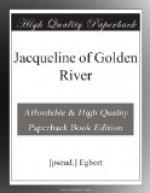“But you went back!” he cried. “You went back, Hewlett!”
“I can tell you no more,” I answered. “Do you believe what I have said to you?”
He looked hard into my face.
“Yes,” he said simply. “And it makes all the difference in the world to me.”
And at that moment, in spite of all, I felt something that was not far from affection toward the man.
“Pere Antoine will marry you?” I asked.
“Yes,” he replied.
“And her father?”
“Is safe in the chateau, playing with his wheel and amassing a fortune in his dreams.”
“One word more,” I continued. “Mme. d’Epernay is very ill. She was struck by one of those bullets that you fired through the door. Wait!” for he had started. “I think that she will live. The wound cannot have pierced a vital part. But we must be very gentle in moving her. You had better bring the sleigh here, and you and I will lift her into it. And then—I shall not see her again.”
CHAPTER XXIII
LEROUX’S DIABLE
I went back toward the cave. But I could not bring myself to see Jacqueline.
Instead, I paced the tunnel to and fro, wondering what my life was going to be in future. Less than three weeks before no thought of love had stirred me, and Jacqueline was undreamed of. Now she had entered into my heart and twined herself inextricably around its roots.
That I should love her till I died I did not doubt at all.
Her last words had been in the nature of a farewell. There was no more to say. Not even good-bye. I must go before that old, insatiable longing for her arose in me again.
I saw her in my mind’s eyes as clearly as though she stood before me. Her loving, gracious presence, her sweet, pure face, her courage, her tenderness—all these were for Leroux. Nothing remained for me, except my memories.
I should have to make a great deal of my life. I had always believed that life was only a prelude to greater and finer things. I was not sure; I am not sure to-day; but if the life that is to come is not the realization of our unfulfilled desires, then nothing matters here. I was thinking of that as I paced the tunnel. And in that way I felt that, in a measure, Jacqueline was still mine.
“Everything that is free,” she had said to me, “thoughts, will and dreams.” That part was mine; and that could never be taken away.
I had reached the verge of the cataract and stood beside the little platform, looking down. There was no star now like that which had guided me in the morning, but the sky was fair and the air mild. I gazed in awe at the great stream of water, sending its ceaseless current down into the troubled lake below.
How many ages it had done that! Yet even that must end some day, as everything ends—even life, thank God!




